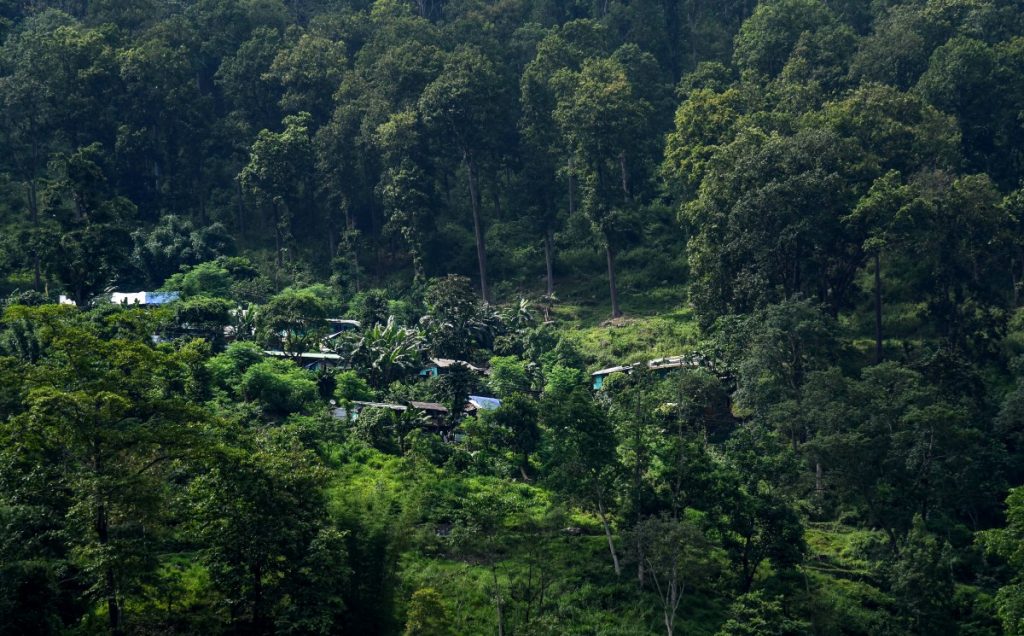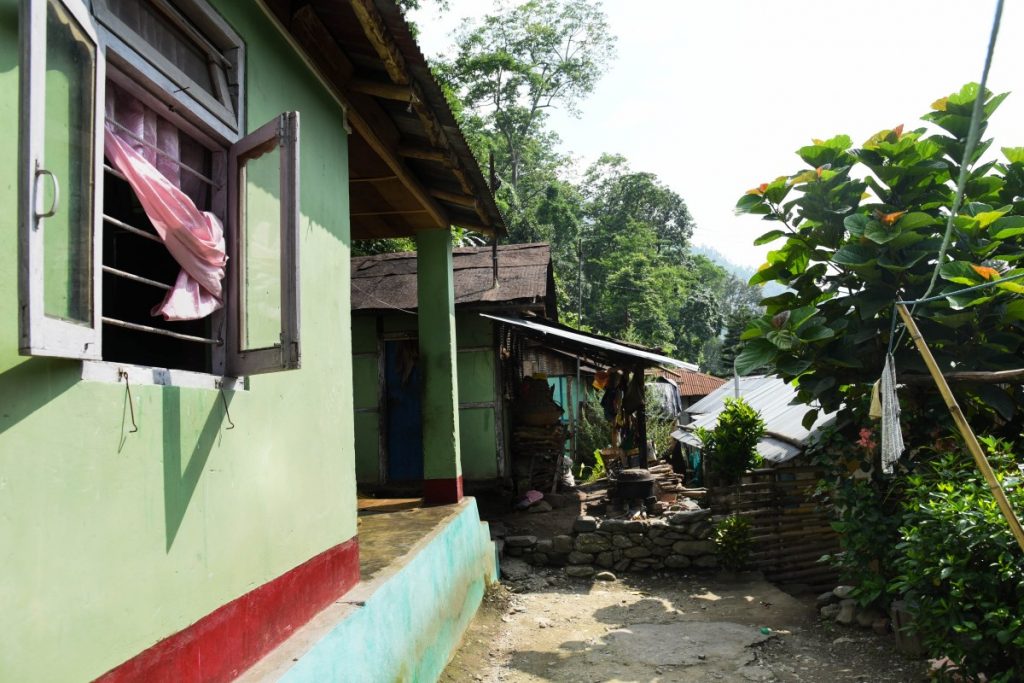The Sevoke-Rangpo railway project will reportedly affect over 40,000 people in Sikkim and West Bengal. However, only 26 families have been identified as being impacted by the project and many have refused compensation, asking for the implementation of the Forest Rights Act and standard compensation.

Landscape of Sikkim. Credit: Tanmoy Bhaduri
Sikkim: This Sevoke-Rangpo railway project recently got a new fillip after the process of land acquisition began in the aftermath of the Doklam face-off between India and China earlier this year. The 52-km rail project aims to connect Sevoke in north Bengal and Rangpo in Sikkim, besides being strategically important to India.

Proposed Sevoke-Rangpo Railway Map. (Right) T14 tunnel construction work started on July 17 with rituals at Khanikhola in Rangpo in Sikkim. It is two km in length. It will be challenging to make tunnel due to geographical constraints. Courtesy: Voice of Sikkim
Work on the project however has been sluggish since Mamata Banerjee laid the foundation stone as railway minister way back in 2009. Sikkim is fully dependent on NH-10 for connectivity to other regions, the only highway that remains frequently cut off due to landslides and separatist movements. While China has expanded its railway network up to the Arunachal Pradesh border, Sikkim does not yet have an operational airport.

There are 40,000 who people will be affected due to this railway project, those living in 24 forest villages including Rongpo, Melli, Kirney, Mongchu, Karmat, Ramvi, Kambhu, Tarkhola in Kalimpong districts of West Bengal. Credit: Tanmoy Bhaduri
At a meeting last month, officers belonging to Northeast Frontier Railways, the state government’s land department, PWD and district administration of Darjeeling and Kalimpong decided to take up all pending projects on a priority basis. But serious obstacles lie in the way of the project’s implementation. For instance, 24 forest villages are going to be affected by the construction. The railway track will pass through 97% of land in West Bengal and 3% in Sikkim. Initially, the residents of forest villages in West Bengal through which the rail tracks will pass, rejected the compensation package. The agitated villagers claimed that the compensation had ignored the Forest Rights Act, 2006.
Development versus forest rights
The Forest Rights Act, 2006 makes it mandatory for the authorities to obtain a NOC (No Objection Certificate) from the gram sabhas. The problem however, in this case, is that panchayat elections have not been held in the hills for the last five years. Even the Gorkha Territorial Administration’s (GTA) election has been pending for a year. “The railway project will affect over 40,000 people living in 24 forest villages, including Rongpo, Melli, Kirney, Mongchu, Karmat, Ramvi, Kambhu, Tarkhola in Darjeeling and Kalimpong districts of West Bengal. The Railways have however only identified only 26 families in Melli village,” said Lila Kumar Gurung, secretary, Himalayan Forest Villagers’ Organisation (HFVO).

Himalayan Forest Villagers’ Organisation (HFVO) organised workshops on Forest Rights Act, 2006 at Rongpo forest village in Kalimpong. Credit: Tanmoy Bhaduri
The West Bengal government has implemented the Forest Rights Act, 2006 in Jalpaiguri and Alipurduar districts in north Bengal but not in Darjeeling and Kalimpong districts. Villagers believe this to be the government’s attempt to marginalise Gorkhas and other indigenous communities in the hills.
“According to law, a detailed plan of the Railway project should be translated into local languages and distributed among affected villagers. There are provisions of multiple public hearings as well. Unfortunately, none of this has happened. We wrote more than ten letters to the state government to implement forest rights in hills,” said Gurung. Nearly every social organisation like the Jan Andalon Party, Akhil Bharatiya Gorkha League, Hill Social Forum have joined hands with the HFVO, which is leading the movement. Those who are not involved in the movement are Trinamool Congress and the Gorkha Janmukti Morcha (GJM), currently backed by state government.
On July 7, there are more than 500 people gathered at community centre in Rangpo forest village from 24 affected villages. They decided to refuse compensation unless the Forest Rights Act is implemented and villagers are given standard compensation. They also expressed grave concern over their land, source of drinking water and livelihood.
Divide and rule
After visiting the affected areas, senior railway officers, representatives from the state government and district government have identified 26 houses in Melli as vulnerable. Railway officials assured of handing them their compensation within 15 days. The villagers were asked to attend a meeting on June 26. “Representatives from the affected families were present at the meeting and we were also with them. But the district magistrate requested us to leave the room as it was a closed door meeting with affected families,” said Amrit Chhetri, Melli gram sabha chief. Villagers reportedly were denied the opportunity to speak about their rights.

Amrit Chhetri, chief of Melli gram sabha, questioned the intention of government. Credit: Tanmoy Bhaduri
Besides, there was no clarity on the compensation package and rehabilitation of the displaced people. Kalimpong’s District magistrate claimed they were working to implement the Forest Rights Act alongside the rail project.
The question is, as Amrit Chhetri pointed out – how (on what basis) were the 26 families chosen when there are more than 350 houses at Melli forest village?

Melli Forest Village in Kalimpong. Credit: Tanmoy Bhaduri
After the meeting, the 26 families decided to give up their land. Even though they still had no clarity about compensation. Gopal Tamang, a member of one of the affected families present at the meeting, said: “We cannot go against the government, we are powerless – what if they decide to acquire our lands by using rifles and bullets. Who will protect us? So, we have submitted our bank details for compensation. We want nothing to do against state.”

These houses are located in Melli, but according to district administration, these will not fall inside the railway track. But residents are afraid that they may be affected due to this project. Credit: Tanmoy Bhaduri
Such an assertion draws attention to the anxiety among the “26 affected families”, their fear of the state machinery. Melli is now torn about whether or not to accept the compensation package.

Houses situated above hill and below were identified as affected by the railways. Credit: Tanmoy Bhaduri
What about the families which have not been identified as eligible for compensation? “Melli will house a big railway station in the Sevoke-Rangpo line. How were the houses situated above and below the hill identified as at risk from the railway project?” asked Ganga Rai, a resident of Melli. Lila Kumar Gurung, who is leading the movement for the Forest Rights Act, said the announcement to give compensation to 26 families is only a ploy to weaken their movement. “We are not against the rail project, we demand our rights.”
Cost of protest
On June 26, the West Bengal government issued a transfer order to Lila Kumar Gurung. This transfer order come after the Darjeeling district magistrate wrote to the state school education department, accusing the teacher him of “trying to stir up unrest.” Most of the political parties in hills condemned the transfer order and described the Mamata Banerjee government as undemocratic.

The proposed Melli railway station will be built here. It will be a big station as it is the meeting point of West Bengal and Sikkim. Credit: Tanmoy Bhaduri
Joyoshi Das Gupta, district magistrate, Darjeeling, told the Indian Express, “There are government servants in different departments, including teachers, who have stayed back in Darjeeling for years without transfers. A section of such officials neglect duty and services and welfare schemes do not reach the people. Moreover, it has been found that they have been involved in acts unbecoming of government employees and stirring up locals. Action being taken according to rules. In the recent case, the teacher have been found to stir up unrest by making false promises to locals in the name of forest rights.”

Lila Kumar Gurung, Secretary, Himalayan Forest Villagers’ Organisation (Right) Darjeeling DM’s wrote a letter to school education department on June 20 regarding Lila Gurung’s transfer. Credit: Tanmoy Bhaduri
Gurung has said, “I got the letter on July 15 from state school education department. I will fight legally, I was part of a democratic movement to ensure forest rights in hills. We wanted that Forest Rights Act be implemented in Darjeeling and Kalimpong. ”
Tanmoy Bhaduri is a Kolkata-based independent photojournalist who focuses on social, cultural and environmental issues.



.jpg)
.jpg)



0 comments:
Post a Comment